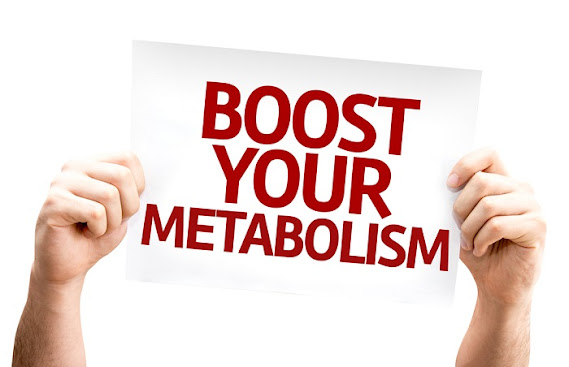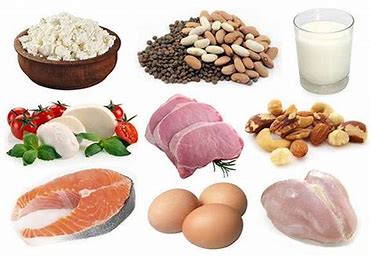How To Boost Your Metabolism?
Note: Friends, if you are comfortable in reading this article in any other language, please change the language from the translate button on the top of this article.
 |
Metabolism is the set of chemical reactions that take place in the body to sustain life |
Overview
Metabolism is the set of chemical reactions that take place in the body to sustain life. It involves the conversion of food into energy, the building and repair of tissues, and the elimination of waste products.
The higher your metabolic rate, the more calories you burn at rest.
Metabolism can be divided into two main processes: catabolism and anabolism.
Catabolism is the process by which large molecules, such as carbohydrates, fats, and proteins, are broken down into smaller molecules, releasing energy in the process.
Anabolism, on the other hand, is the process by which small molecules are combined to form larger molecules, using energy in the process.
Symptoms Of Slow Metabolism
It can be difficult to know for sure whether your metabolism is "weak" or "strong" without a medical assessment.
However, there are some signs and symptoms that may suggest a slower metabolism:
Difficulty losing weight:
If you have a slower metabolism, you may find it more difficult to lose weight even when you're following a healthy diet and exercise routine.
Fatigue:
A slower metabolism can cause fatigue, as your body may not be efficiently converting food into energy.
Feeling cold:
A slower metabolism can make you feel colder, as your body may not be producing as much heat.
Poor digestion:
If your metabolism is slow, your digestive system may not be working efficiently, leading to bloating, constipation, and other digestive issues.
Irregular periods:
In women, a slower metabolism can lead to irregular menstrual periods.
Dry skin:
A slower metabolism can reduce the production of natural oils in the skin, leading to dryness and flakiness.
Weakness and muscle aches:
A slow metabolism can reduce the production of energy, leading to feelings of weakness and muscle aches.
Mood changes:
A slow metabolism can affect the production of hormones, leading to mood changes like depression, anxiety, and irritability.
High cholesterol levels:
A slower metabolism can lead to an accumulation of cholesterol in the blood, which can increase the risk of heart disease.
Hair loss:
A slow metabolism can affect the production of hair follicles, leading to hair loss or hair fall.
It's important to note that many of these symptoms can also be caused by other factors, so it's important to talk to your doctor if you have concerns about your metabolism or experience any of these symptoms.
Home Remedies To Boost And Improve Low Metabolism
Please see the above video for reference
- Do Oil Pulling or Kunjal Kriya on empty stomach 3 times a week.
- Eat a nutrient and protein-rich breakfast like an omelet, whole grain bread, milk, oatmeal, almonds, and berries.
- Do some intense or heavy exercise. It will burn calories even when you are not doing exercise.
- Eat lots of fish, flax seed oil, walnuts, and eggs.
- Drink 4-5 cups of green tea including hot and iced.
- Keep grazing. Go for 6 small meals rather than 3 heavy meals.
- Mix half lemon juice, 1 teaspoon of honey, and half teaspoon of black pepper powder in a glass of warm water.
- Drink this every morning on empty stomach before brushing your teeth.
Some More Tips To Help Boost Your Metabolism:
Build muscle:
Muscle burns more calories than fat, so strength training exercises can help increase your metabolism over time.
Try to include resistance training exercises like weight lifting, bodyweight exercises, or resistance bands into your workout routine.
Stay active:
Regular physical activity can help increase your metabolism, even when you're not exercising.
Try to incorporate more movement into your daily routine, such as taking the stairs instead of the elevator, going for a walk during your lunch break, or doing some light stretching while watching TV.
Get enough sleep:
Lack of sleep can slow down your metabolism, so it's important to prioritize getting enough sleep each night. Aim for 7-9 hours of sleep per night.
Eat enough protein:
Protein requires more energy to digest than carbohydrates or fats, so increasing your protein intake can help boost your metabolism.
Try to include protein-rich foods like lean meats, fish, eggs, beans, and nuts in your diet.
Drink plenty of water:
Drinking enough water can help keep your metabolism functioning properly, as dehydration can slow down your metabolism. Aim to drink at least 8 glasses of water per day.
Eat smaller, more frequent meals:
Eating smaller, more frequent meals throughout the day can help keep your metabolism running efficiently. Try to eat 5-6 small meals instead of 2-3 large meals.
Eat a balanced diet:
A balanced diet with a mix of carbohydrates, proteins, and healthy fats can help keep your metabolism functioning properly.
Avoid extreme or restrictive diets, which can slow down your metabolism and be harmful to your health.
Don't skip meals:
Skipping meals can slow down your metabolism and make it harder to lose weight.
Try to eat regular, balanced meals throughout the day to keep your metabolism running smoothly.
Avoid sugary and processed foods:
Sugary and processed foods can cause blood sugar spikes and crashes, which can disrupt your metabolism.
Try to limit your intake of these types of foods and focus on whole, nutrient-dense foods instead.
Drink green tea:
Green tea contains antioxidants and caffeine, which can help boost your metabolism.
Try drinking a cup of green tea in the morning or afternoon to help increase your metabolism.
Manage stress:
Chronic stress can cause an increase in the hormone cortisol, which can slow down your metabolism.
Find healthy ways to manage stress, such as exercise, meditation, or spending time in nature.
Avoid alcohol:
Drinking alcohol can slow down your metabolism and interfere with your body's ability to burn fat. Try to limit your alcohol intake or avoid it altogether.
Remember that everyone's metabolism is different, and what works for one person may not work for another.
Our Other Must-Read Articles:
What are meals good for boosting metabolism?
While there is no one specific food or meal that will magically boost your metabolism, here are some tips on the types of meals and foods that can be helpful:
Protein-rich meals:
 |
| Protein can increase your metabolic rate |
Protein is more difficult for the body to digest, which means that it can increase your metabolic rate as your body works to break it down.
Good sources of protein include lean meats, fish, eggs, tofu, beans, and nuts.
Fiber-rich meals:
Foods high in fiber can help regulate blood sugar levels, which can help keep your metabolism functioning properly.
Good sources of fiber include fruits, vegetables, whole grains, and legumes.
Spicy meals:
Spices like chili peppers and cayenne pepper contain a compound called capsaicin, which can help increase your metabolism.
Adding a little bit of spice to your meals can help give your metabolism a temporary boost.
Green tea:
As I mentioned earlier, green tea contains caffeine and antioxidants that can help increase your metabolism.
Drinking a cup of green tea in the morning or afternoon can help give your metabolism a little extra boost.
Water-rich meals:
Drinking enough water is important for keeping your metabolism functioning properly.
Eating meals that contain water-rich foods like fruits and vegetables can help ensure that you're getting enough fluids.
Balanced meals:
Eating a balanced diet that includes a mix of carbohydrates, proteins, and healthy fats can help keep your metabolism functioning properly.
It's important to note that these are just general guidelines and that individual results may vary.
What Meals Are Not Good For Metabolism?
While there are no foods that you should completely avoid to boost your metabolism, there are certain foods and habits that can negatively affect your metabolism. Here are some examples:
Processed and sugary foods:
Foods that are high in sugar and processed ingredients can cause blood sugar spikes and crashes, which can disrupt your metabolism.
These foods are also often high in calories and low in nutrients, which can make it harder to maintain a healthy weight.
Alcohol:
Drinking alcohol can slow down your metabolism and interfere with your body's ability to burn fat. It's a good idea to limit your alcohol intake or avoid it altogether.
Skipping meals:
Skipping meals can slow down your metabolism and make it harder to lose weight. It's important to eat regular, balanced meals throughout the day to keep your metabolism running smoothly.
Eating too few calories:
Eating too few calories can slow down your metabolism, as your body goes into "starvation mode" and conserves energy.
It's important to eat enough calories to support your daily activities and exercise routine.
Lack of physical activity:
A sedentary lifestyle can slow down your metabolism, as your body burns fewer calories throughout the day.
Regular physical activity can help keep your metabolism functioning properly.
Some Frequently Asked Questions On Metabolism
Here are some frequently asked questions and their answers related to metabolism:
Q, Can exercise help boost my metabolism?
A. Yes, exercise can help increase your metabolism, as it builds muscle and burns calories. High-intensity interval training (HIIT) and weight training are particularly effective for boosting metabolism.
Q. Can certain medical conditions affect my metabolism?
A. Yes, certain medical conditions can affect your metabolism, such as hypothyroidism (an underactive thyroid gland) and Cushing's syndrome (an excess of the hormone cortisol).
Q. Can drinking water help boost my metabolism?
A. Drinking enough water is important for keeping your metabolism functioning properly, as dehydration can slow down your metabolism.
However, while drinking water is essential for good health, it is not a magic metabolism booster.
Q. Can lack of sleep affect my metabolism?
A. Yes, lack of sleep can slow down your metabolism, as it can disrupt the hormones that regulate appetite and energy expenditure.
Getting enough sleep is important for maintaining a healthy metabolism.
Q. Can stress affect my metabolism?
A. Yes, chronic stress can slow down your metabolism, as it can increase levels of the hormone cortisol, which can cause the body to store more fat.
Managing stress through techniques like meditation and exercise can be helpful for maintaining a healthy metabolism.
Q. Does age affect my metabolism?
A. Yes, metabolism tends to slow down as you age, which can make it harder to maintain a healthy weight.
This is partly due to a loss of muscle mass, which decreases the number of calories your body burns at rest.
Q. Can genetics affect my metabolism?
A. Yes, genetics can play a role in your metabolism, as some people are naturally predisposed to have a faster or slower metabolism.
Q. Can eating small, frequent meals boost my metabolism?
A. While some studies have suggested that eating small, frequent meals throughout the day can boost metabolism, the evidence is mixed.
Q. Can certain supplements boost my metabolism?
A. While there are many supplements on the market that claim to boost metabolism, there is limited evidence to support their effectiveness.
Q. Can smoking affect my metabolism?
A. Yes, smoking can speed up your metabolism, as it increases the body's energy expenditure.
However, the harmful effects of smoking on your overall health far outweigh any potential metabolism-boosting benefits.
Q. Can certain medical treatments affect my metabolism?
A. Yes, certain medical treatments, such as chemotherapy and some medications for depression and other conditions, can affect metabolism.
If you are undergoing medical treatment and have concerns about how it may be affecting your metabolism, it's important to talk to your doctor.
Friends, Stay Fit, Stay Happy
----------------------------------------------------------------------------
Friends, if you liked it, please share it with your friends.
SHARING IS CARING.
Compiled by: Paramjit Singh Rana



Comments
Post a Comment